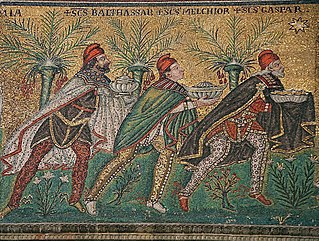
In Christianity, the Biblical Magi, also known as the Three Wise Men, Three Kings, and Three Magi, are distinguished foreigners who visit Jesus after his birth, bearing gifts of gold, frankincense, and myrrh in homage to him. They are commemorated on the feast day of Epiphany—sometimes called "Three Kings Day"—and commonly appear in the nativity celebrations of Christmas.
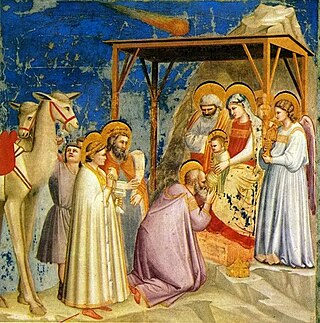
The Star of Bethlehem, or Christmas Star, appears in the nativity story of the Gospel of Matthew chapter 2 where "wise men from the East" (Magi) are inspired by the star to travel to Jerusalem. There, they meet King Herod of Judea, and ask him:
Where is He who has been born King of the Jews? For we have seen His star in the East and have come to worship Him.
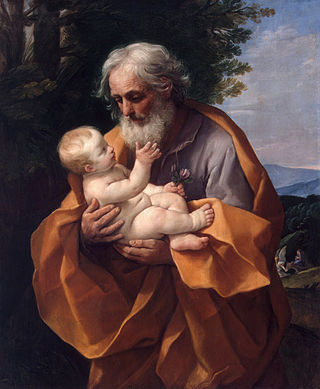
Matthew 1:25 is the twenty-fifth and final verse of the first chapter of the Gospel of Matthew in the New Testament. Joseph has awakened from a dream in which an angel gave him instructions about the birth of Jesus. He has taken Mary into his home, completing their marriage. In this verse, Jesus is born and his name is given to him by Joseph.
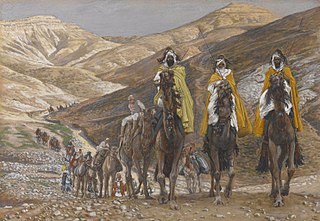
Matthew 2:1 is the first verse of the second chapter of the Gospel of Matthew in the New Testament. The previous verse ends with Jesus being named by his father. This verse marks the clear start of a new narrative, although the use of a quotation from Isaiah 7:14 in Matthew 1:23 is also reflected in the use of four Old Testament quotations in chapter 2.

Matthew 2:2 is the second verse of the second chapter of the Gospel of Matthew in the New Testament. The magi travelling from the east have arrived at the court of King Herod in Jerusalem and in this verse inform him of their purpose.

Matthew 2:3 is the third verse of the second chapter of the Gospel of Matthew in the New Testament. In the previous verse the magi had informed King Herod that they had seen portents showing the birth of the King of the Jews. In this verse he reacts to this news.

Matthew 2:4 is the fourth verse of the second chapter of the Gospel of Matthew in the New Testament. The magi have informed King Herod that they had seen portents showing the birth of the King of the Jews. In this verse he calls together leading figures of Jerusalem to find out where Jesus was to be born.

Matthew 2:5 is the fifth verse of the second chapter of the Gospel of Matthew in the New Testament. The magi have informed King Herod that they had seen portents showing the birth of the King of the Jews. Herod has asked the leading Jewish religious figures about how to find out where Jesus was to be born. In this verse they tell him.
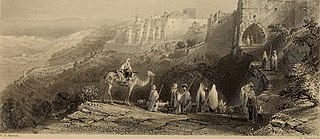
Matthew 2:6 is the sixth verse of the second chapter of the Gospel of Matthew in the New Testament. The magi have informed King Herod that they had seen portents showing the birth of the King of the Jews. Herod has asked the leading Jewish religious figures about how to find out where Jesus was to be born. In this verse they tell him by quoting from the Book of Micah.
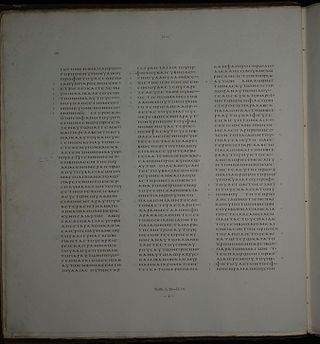
Matthew 2 is the second chapter of the Gospel of Matthew in the New Testament. It describes the events after the birth of Jesus, the visit of the magi and the attempt by King Herod to kill the infant messiah, Joseph and his family's flight into Egypt, and their later return to live in Israel, settling in Nazareth.

Matthew 2:8 is the eighth verse of the second chapter of the Gospel of Matthew in the New Testament. The magi have informed King Herod that they had seen portents showing the birth of the King of the Jews. After consulting with the leading Jewish religious figures Herod sends the magi to find the infant.

Matthew 2:9 is the ninth verse of the second chapter of the Gospel of Matthew in the New Testament. King Herod has dispatched the magi to Bethlehem to find the infant Jesus. In this verse they follow the Star of Bethlehem to find the infant.

Matthew 2:10 is the tenth verse of the second chapter of the Gospel of Matthew in the New Testament. The magi, dispatched by King Herod, have been shown the location of the infant Jesus by the Star of Bethlehem. In this verse they react to this.

Matthew 2:11 is the eleventh verse of the second chapter of the Gospel of Matthew in the New Testament. The magi, dispatched by King Herod, have found the small child Jesus and in this verse present him with gifts in an event known as the Visit of the Wise Men. In art, is traditionally referred to as the Adoration of the Magi.

Matthew 2:12 is the twelfth verse of the second chapter of the Gospel of Matthew in the New Testament. The magi, dispatched by King Herod, have found and paid homage to the Infant Jesus. In this verse this they return home rather than to Herod.

Matthew 2:13 is the thirteenth verse of the second chapter of the Gospel of Matthew in the New Testament. The magi have left after paying homage to the young Jesus. In this verse an angel warns Joseph that he must flee.

Matthew 2:14 is the fourteenth verse of the second chapter of the Gospel of Matthew in the New Testament. Joseph has been warned in a dream that he must flee to Egypt to escape the wrath of King Herod. An event known as the Flight into Egypt.
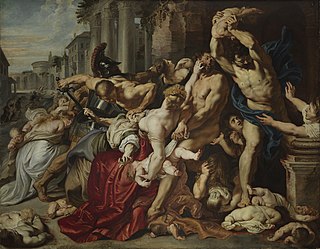
Matthew 2:16 is the sixteenth verse of the second chapter of the Gospel of Matthew in the New Testament.
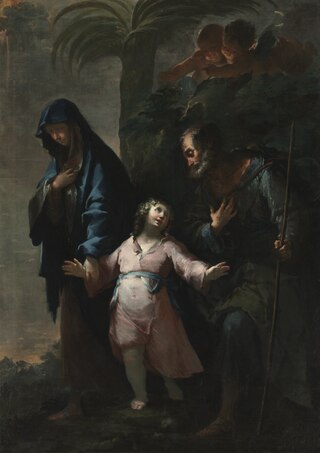
Matthew 2:23 is the twenty-third verse of the second chapter of the Gospel of Matthew in the New Testament. The young Jesus and the Holy Family have just returned from Egypt and in this verse are said to settle in Nazareth. This is the final verse of Matthew's infancy narrative.

Matthew 8:5 is the fifth verse of the eighth chapter of the Gospel of Matthew in the New Testament. This verse begins the miracle story in which a centurion's servant is healed, the second of a series of miracles reported in Matthew.




















